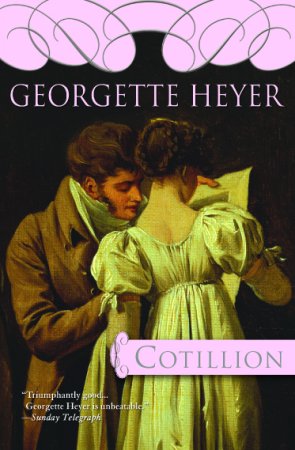 genre: historical fiction
genre: historical fictionTHIS is why people read Heyer, I'm sure. Cotillion is light and frivolous, full of match-making and high society.
Kitty has been raised by an odious and crabby guardian, who now swears that only Kitty will receive his fortune if he dies...IF she marries one of his great-nephews. WELL. Between her schemes to get herself to London and the follies of those men - how can humorous episodes NOT ensue? This is Regency period social drama at its finest.
WELL. I tried Heyer again because my buddy Melissa, over at Book Nut, had the grand idea to do a buddy review! So, we read it together and then had a little discussion online. There aren't any spoilers in here, so go ahead and enjoy part one HERE, and then continue on...below :)
part 2 of the buddy review:
Corinne: Yes! She threw me for a loop there too, I expected caddishness but not that! One thing about the book that I really liked - that actually encouraged me to seek out more information on my own - was the discussion of London "society" at the time - the ton and the fancy invite-only clubs. The rules were so strict and the punishments so seemingly severe in you stepped out of "line" (whatever the "line" happened to be at the time).
Melissa: I didn't pick up on that, but, yes, it's fascinating and admirable how she worked it in quite seamlessly. While we're talking about London society rules, any thoughts on Olivia, the Chevalier, and Kitty's role in their relationship? I found it to be one of the more fascinating subplots.
Corinne: The beautifully perfect Olivia? She snuck up on me and I was surprised by how integral she became to the story. I liked her and that she rather seemed to rise above societal concerns. The poor girl just wanted to be happy! I appreciated that Kitty, too, seemed to care more about Olivia's and the Chevalier's happiness (or the Dolph's, for that matter) than she did for what society expected for those poor souls.
Melissa: That's a good point about Kitty. There's some "country mouse-city mouse" dynamics going on in the book: Kitty -- who was raised in the country without all the refinements of the social scene -- is really the only one to show poor Olivia and poor Dolph any mercy. Do you think Heyer was doing a bit of social criticism there, or am I just reading too much into it?
Corinne: I DO see it as a bit of social criticism - since the characters who don't let themselves be trapped by that society are happier! Olivia's mother and Dolph's mother, who see society as the ultimate goal, are miserable and crabby.
Melissa: You're right. Though it probably also says something about mothers: perhaps Kitty's normal because she grew up without one?? Is there anything else about the book you'd like to discuss?
Corinne: Ahh, good point about Kitty not having a mother. I think I'd just like to THANK you for encouraging me to get Heyer another try. This was a gem :)
Melissa: You're welcome! I'm glad you found one that you enjoyed. I think like many authors who write/wrote a whole lot, she's really hit-and-miss, but the good ones are really fun.
































1 comment:
I'm SO glad we did this Corinne; I had a blast. We ought to do another one sometime. (Maybe a three-way with Tricia? That would be fun, too.)
Post a Comment